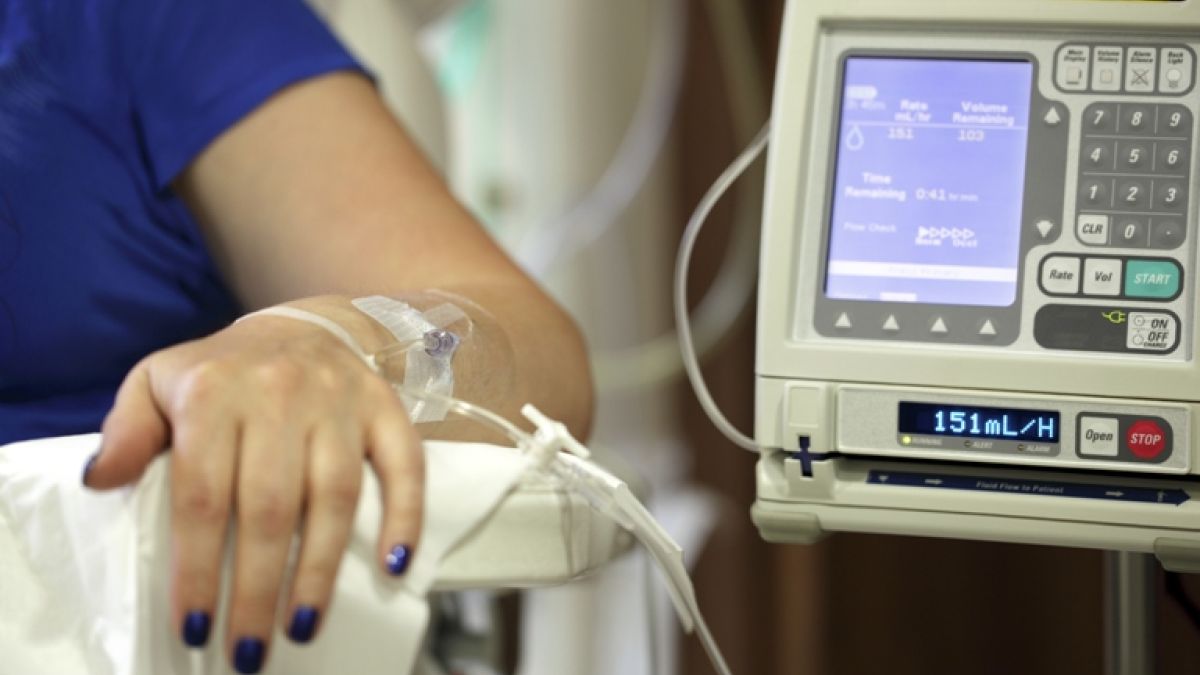Why choose Ochsner Health for IV infusion therapy?
Ochsner provides intravenous (IV) infusion therapy for various medical conditions at locations in Baton Rouge, Breaux Bridge, Covington, Crowley, Gretna, Jefferson, Jennings, Kaplan, Kenner, Lafayette, Luling, Metairie, Morgan City, New Iberia, New Orleans and Raceland, Louisiana, as well as Bay St. Louis, and Meridian, Mississippi.
Whether the goal is to cure, manage or provide palliative care, which focuses on relieving symptoms and improving quality of life for patients with chronic illnesses like cancer, the Ochsner infusion services team delivers personalized IV infusion therapy using advanced technology.
At our certified infusion centers, patients can meet with a care team member, complete lab work and receive IV infusion therapy in one convenient location. Each center is staffed by certified nurses and support teams dedicated to providing high-quality care in a compassionate environment.
Choosing Ochsner for your IV infusion therapy needs means you’ll receive expert care in a clean, comfortable and supportive environment. Our infusion centers are designed with patient comfort in mind, featuring private or semi-private infusion bays, Wi-Fi access and reclining chairs. Many of our centers also offer flexible scheduling, same-day appointments and support from on-site pharmacists and lab technicians.
Ochsner’s team collaborates closely with primary care providers, oncologists and specialists to ensure a seamless treatment experience. From your initial consultation to follow-up care, we are here to guide you every step of the way.
Our infusion centers hold certifications from the following organizations:
- American College of Surgeons Commission on Cancer
- Quality Oncology Practice Initiative
- The Joint Commission
Our chemotherapy infusion units also carry certifications from the American Society of Clinical Oncology.
What is IV infusion therapy?
IV infusion therapy is a treatment that delivers fluids, medications, or nutrients directly into your bloodstream through a vein. This allows the body to absorb them quickly and ensures you receive the right dose. It is often used in hospitals, clinics, or outpatient centers, especially when you cannot take medicine or fluids by mouth.
At Ochsner, IV infusion treatment is tailored to each patient’s diagnosis and overall care plan. We offer a wide range of infusion services, including:
- Hydration therapy: Replaces fluids and electrolytes lost through illness, heat or surgery.
- Medication infusion: Delivers antibiotics, chemotherapy or pain medication directly into the bloodstream.
- Nutritional infusion: Provides essential vitamins, minerals and nutrients when you cannot eat or absorb them through digestion.
How does IV infusion therapy work?
The process of receiving IV infusion therapy is simple.
First, the healthcare team gathers sterile supplies such as gloves, an IV catheter, alcohol wipes, tubing and the fluid bag. They place a tourniquet around the upper arm to make the vein easier to access. After cleaning the area, they gently insert the catheter.
Once the catheter is in place, the tourniquet is removed and the IV bag is attached. The fluids or medications then flow into the bloodstream at a controlled speed. Depending on the type of treatment, the infusion may take just a few minutes or several hours.
During the session, the healthcare team watches vital signs and checks the IV site for swelling, redness or pain. If any issues arise, they can adjust the flow or take other necessary steps.
When the infusion is complete, the catheter is removed, and a bandage is applied over the site.
What are the benefits of IV infusion therapy?
One of the biggest benefits of IV infusion therapy is how quickly it works. Because the fluids or medications go straight into the bloodstream, your body can use them almost right away. This is much faster than waiting for a pill to pass through your digestive system.
In emergencies, this rapid action can make a significant difference. It is also useful for people who need fast rehydration or quick pain relief.
Another benefit is that it helps support hydration and balance important minerals in the body. People with chronic illnesses, such as kidney disease or gastrointestinal problems, often struggle to stay hydrated. IV infusion therapy ensures the body receives the fluids and minerals it needs to regulate blood pressure, body temperature and other vital functions.
This treatment can also help address specific health problems. People undergoing chemotherapy, managing migraines, or living with fibromyalgia may receive IV infusions to ease symptoms and support healing.
In short, IV infusion therapy offers more than just hydration. It provides fast medication delivery, keeps the body balanced and supports recovery from various health issues.
Is IV infusion therapy safe?
IV infusion therapy is generally safe when performed by trained healthcare workers in a hospital, clinic or certified infusion center. These settings follow strict safety protocols to reduce risks.
Still, like any medical treatment, there can be side effects. Minor issues such as bruising, swelling or discomfort at the IV site are fairly common. In rare cases, more serious complications such as infections, allergic reactions or vein inflammation (phlebitis) can occur.
Some people may face a higher risk of side effects, especially those with weakened immune systems, heart conditions or a history of allergies. That is why it is important to have a full medical evaluation before starting IV infusion therapy to ensure it is a good fit.
When done correctly, IV infusion therapy is a safe and effective way to deliver fluids, medications and nutrients directly into the bloodstream. Talk to your healthcare provider to figure out if it is right for you.
What should you know about IV hydration therapy?
IV hydration therapy is one of the most popular forms of IV infusion therapy. It is designed to quickly restore fluids and electrolytes when the body is dehydrated. This can happen due to illness, intense exercise, travel, heat exposure or even a hangover.
The solution typically includes a mix of sterile water, sodium chloride (salt), and electrolytes such as potassium and magnesium. In some cases, vitamins like vitamin C or B vitamins are added for more support.
By delivering fluids directly into the bloodstream, IV hydration therapy helps the body recover much faster than drinking fluids alone. It can help relieve symptoms such as headache, fatigue, muscle cramps and nausea.
While IV hydration therapy is safe when administered by trained professionals, it is not necessary for everyone. Most people can stay hydrated by drinking water and eating a balanced diet. If you are considering this treatment, talk with a healthcare provider to determine if it is right for you.




